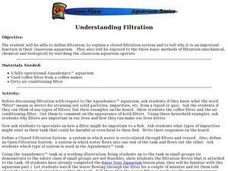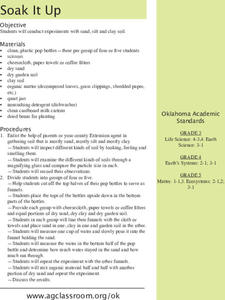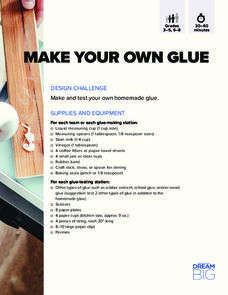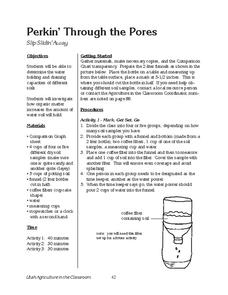Curated OER
Excretory System
Students discuss what happens to the trash in their home. They talk about what would happen if they didn't remove the trash. Students relate their home trash to the excretory system of their bodies. They label a diagram of the urinary...
Curated OER
THE INCREDIBLE JOURNEY
Students describe the movement of water within the water cycle and identify the states of water as it moves through the water cycle.
Curated OER
Gonna Take a Sedimentary Journey
Students collect water samples from a local source, test it, filter it and identify the materials suspended in it. Students disucss the possible sources of sediment in their watershed.
Curated OER
Understanding Filtration
Students discuss the work "Filter." They list types of filters they know about and look at both clean and used filters. Students speculate on how a filter might be important to a fish. They listen to the instructor tell them about...
Curated OER
Soak It Up
Young scholars examine the various materials that make up their local soils. In groups, they record how each material is different and use cheesecloth to filter them into a bottle based on particle size. They use the soils to determine...
Curated OER
Water Pollution
Fifth graders study the impact of human activity on water quality and on the ecosystems of Earth. After a discussion on the various ways that water can be polluted, groups of youngsters get together to figure out the best way to clean a...
DiscoverE
Water Pollution Cleanup
How do scientists determine the best method for removing pollutants from our water sources? Environmental scholars experiment with pollution clean-up options to discover which are the most cost-effective, fastest, and most thorough....
Cornell University
Forensic Science: Case of the Missing Diamond Maker
Someone stole a diamond-making machine. Who done it? Scholars use forensic science at six different stations to determine the culprit. They analyze fingerprints, use their senses, and complete chemistry experiments to determine the...
Curated OER
Neither Wind Nor Rain
Here is another in the interesting series of lessons that use the special State Quarters as a learning tool. This one uses the North Dakota State Quarter. During this lesson, your class learns about the different patterns of erosion, and...
American Chemical Society
Formation of a Precipitate
Conclude this chemical change unit by having your class combine two liquids that result in formation of a precipitate. The learners discover that chemical reactions result in new materials. Make sure to consider all of the preceding...
Discovery Education
By All Indications
How do people determine if something is acidic or basic? Learners make their own acid-base indicators using red cabbage and then determine the acidity and alkalinity of different substances. First, they test substances of known pH and...
Curated OER
Does Soil Get Soggy?
Study the properties of soil and water absorption with a science activity. Based on a paragraph with background knowledge on sandy soil, silt, and clay soil, third graders choose which illustration represents a bottle full of sandy soil....
LABScI
The Separation Lab: Candy Colors
There's no better motivator than candy! An engaging activity has pupils explore methods for separating mixtures. A two-part lab first explores methods of separation based on size and magnetism. The second activity introduces learners to...
NASA
Cleaning Water
Give young scientists a new appreciation of fresh, clean drinking water. After learning about the ways astronauts recycle their air and water, your class will work in small groups creating and testing their very own water filtration...
Curated OER
Wetland Metaphors
Learners describe the characteristics of wetlands and identify their ecological functions. They inspect items and use them to create metaphors about wetlands.
Beyond Benign
SLS Toxicology Test
Ingredients in your shampoo are toxic enough to kill plants. The 16th installment of the series of 24 tests the toxicity level of various concentrations of SLS, a chemical found in nearly all shampoo. Learners prepare percent solutions...
Curated OER
Solving Mysteries Using Paper Chromotagraphy
Middle schoolers solve the mystery of the kidnapped teacher by analyzing a ransom note using paper chromatography. They carefully prepare ink samples from the note to known ink samples to determine the kidnapper.
DiscoverE
Make Your Own Glue
You won't regret being stuck with this activity. By mixing a variety of household items, pupils create their own glue. They test the tensile strength of their glue and compare it to that of other adhesives.
Curated OER
Slash Trash! Reducing, Reusing and Recycling Our Way to Zero Waste
The other "Three Rs" are covered in this lesson: reduce, reuse, and recycle. Over four weeks, conservationists collect data about waste in their own homes. They combine their findings with those of other students in order to analyze...
Texas State Energy Conservation Office
Investigation: Greenhouse Effect
Pupils compare the temperature change in a closed and open box as a demonstration of the greenhouse effect.
Curated OER
Capillary Action
Students experiment with capillary action. Capillary action enables soil moisture to move in any direction within the soil as water moves from wet areas to drier areas. Capillary rise of water occurs especially in and regions where...
Curated OER
Chromatography of Foods
Students complete a counter top chemistry experiment on the chromatography of foods. The experiment is based upon the relative attraction of the components of the mixture for the mobile phase (water) and the stationery phase (paper).
Curated OER
Recycling
Third graders observe the importance of recycling. In this environmental activity, 3rd graders will view experiments on water filtration, paper-making, and breathing pollutants, and will categorize recyclable materials.
Curated OER
Perkin' Through the Pores
Students investigate how organic matter increases the amount of water soil will hold. In this water soil lesson plan, students use soil and measure water amounts using organic matter. Students measure the water holding capacities.

























